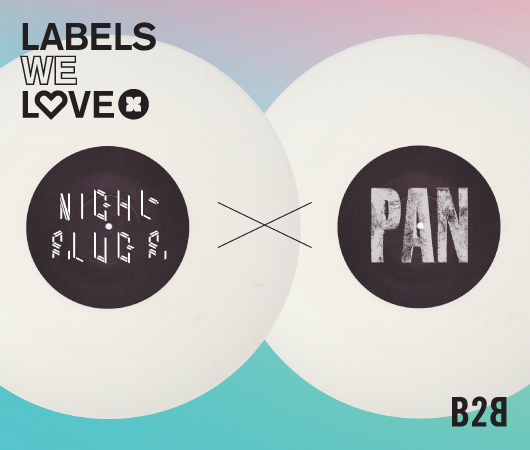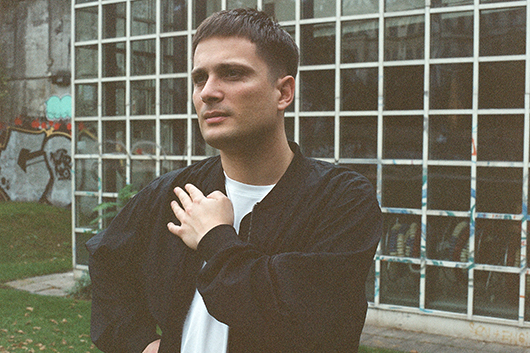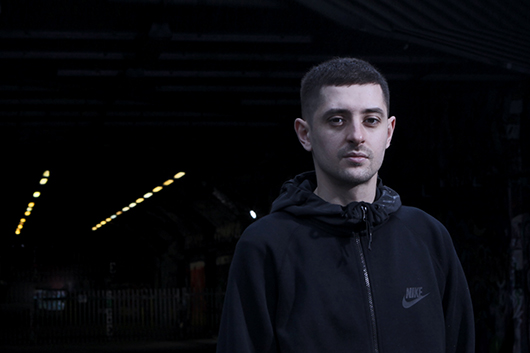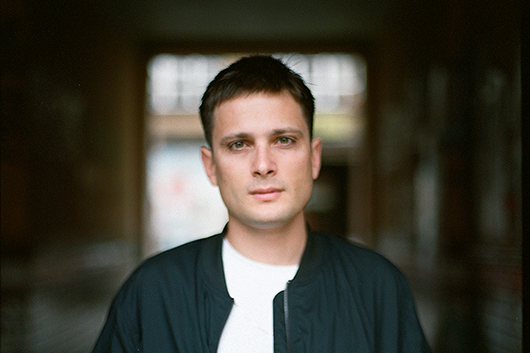Labels We Love: Night Slugs B2B PAN
All week long, XLR8R is presenting its annual focus on Labels We Love. Click here […]

Labels We Love: Night Slugs B2B PAN
All week long, XLR8R is presenting its annual focus on Labels We Love. Click here […]

All week long, XLR8R is presenting its annual focus on Labels We Love. Click here to check out the rest of the series.
There’s little denying that Night Slugs and PAN have been two of the most innovative labels in electronic music during the past few years. Founded in London in 2010 and 2008 respectively, both imprints have since worked ceaselessly, carving out their own distinct paths at the increasingly flexible borders between dance music and electronic experimentation. On a superficial level, PAN and Night Slugs may not seem to have that much in common. Shortly after starting the label, PAN founder Bill Kouligas relocated to Berlin, where the label has since played host to a wide range of artists from around the globe, many of them coming from experimental music and sound art backgrounds. Night Slugs, on the other hand, emerged deeply embedded in the London club scene, a world that co-founders Alex Sushon (a.k.a. Bok Bok) and James Connolly (a.k.a. L-Vis 1990) had been participating in for years before the need for their own label arose. Over time, the imprint has forged its own sonic path, with the majority its output being created by a tight-knit crew of like-minded producers.
Still, Night Slugs and PAN do share some common ground, and are perhaps united more by their approach. There’s a similar sense of integrity and commitment to their artists’ visions, not to mention an experimental outlook that has allowed both labels to transcend their respective contexts. In light of this, we spoke with Bill Kouligas and Alex Sushon about the trajectories PAN and Night Slugs have taken thus far, their sometimes oblique relationship to club music, as well as the challenges of running a small- to medium-sized independent music label in 2014.
XLR8R: What was the impetus for starting Night Slugs and PAN respectively? Both came out of quite specific but quite different contexts and then went on to become very strong forces in reshaping those contexts.
Alex Sushon: In my case, it was really just that we didn’t have a club to play in that we felt at home in. The stuff that we were playing and the kind of stuff that our friends were making, there really wasn’t a platform for anything like that necessarily. We felt like the best thing to do was to cultivate and kind of create a platform for something that didn’t exist yet, and so that was really the motivation for both the club night and the label.
Bill Kouligas: PAN comes from a very different background, because it doesn’t come from a club culture per se. It was more like a platform that could put together friends and artists that I respected, that could create a general conversation that would reflect off each other, and that also reflected the different cities that I lived in. I’m originally from Athens, Greece, but I lived in London for seven years and after that I moved to Berlin. All these different places had a lot of impact on me, so I try to put all of these different influences together and have all of these different people interact and basically see what comes out of it.
Bill Kouligas

XLR8R: How important is maintaining a sense of ongoing evolution of the label’s sound and aesthetic to the long-term viability of your respective labels?
AS: I’m sure you will both agree with me on this, but it has to keep evolving, it has to keep changing. The artists I work with, they drive that. And if I’m making the music and writing the tracks and stuff, we all kind of drive that. It’s a really natural process and it’s one that I can see happening on its own without any input from me necessarily, because it’s part of a conversation between the artists.
BK: I fully agree on this actually, it’s important to grow organically. Also, the world is changing, so you can just be stuck with the same idea over and over again—your interests change and it’s important to develop your ideas and just try and risk things than to weigh them up all the time. More interesting stuff can happen if you do that.
XLR8R: Both of your labels have very strong, very distinctive visual aesthetics. Could you speak to the development of that and your involvement in this?
AS: We actually have this in common, don’t we Bill? We both art direct our respective labels.
BK: Yeah, yeah.
AS: In my case, it wasn’t something I actually thought about or planned very much in advance—it was just the things that felt right at the time were what I’d be using for art. I do speak to the musicians and try to figure what they want or what direction they might want to go in, but in my case, a lot of it is kind of associative. The experience that I get from the tracks or the kinds of places they take me in my imagination is what I try and capture in the art. I’ve talked about this pretty extensively in the past, so I’m not going to bore people too much, but essentially it’s about visualizing spaces and trying to give music another dimension to live in.
BK: In a way, it’s the same here. I studied graphics in London and I started the label after I had been working in advertising for a long time, and so when I had the idea of the label, it was always important for me to express all my visual work with it as well. I have a specific idea about how I want it to look, but it’s also very open. I always have the artist contribute to it. Otherwise, the artwork is just different with each release because it has to do with the overall concept of what that record is about or what these people represent with their work. It’s a general conversation that I kind of direct.
XLR8R: Do you see certain affinities between your respective labels?
AS: Yeah, for sure I do. I love the way that Bill goes about the direction of everything and I think there’s a thoroughness there. I don’t know, correct me if I’m wrong Bill, it just seems like you go about things in a very thorough way and think things through, which I very much appreciate.
BK: The thing is, I think it’s really important that when you’re involved so much in this culture in general to be really dedicated and just expound it and express it the best way you can. And I feel like although [Night Slugs and PAN] might be doing different stuff, there’s a common ground in maybe the ethos or the attitude or the way we do stuff.
Alex Sushon (a.k.a. Bok Bok)

XLR8R: Bill, you started PAN while you were still living in London, shortly before relocating to Berlin. How do you see that move shaping the label, both aesthetically and musically?
BK: As I briefly mentioned earlier, each place has a big impact in what we do. Berlin is a very different place than London, so I was just really open when I moved here to see what the city would bring to me and what I could bring back to the city itself. Also, I might be based here, but the artists are from all over the place. Like, I have artists in Japan and a lot in London still, as well as a lot in Berlin and a lot of from the US. It’s really international in this way.
XLR8R: And Alex, I’m wondering how you think of Night Slugs in terms of it being a London label, one which in a sense could only have come from London, but that recently has been noticeably looking to various strands of American dance music, such as ghetto house and vogue, for sonic inspiration.
AS: I would say that the transatlantic thing is something that has been key to what we’ve been doing from the start. If you look at the roster, we had people like Kingdom and Egyptrixx right from the start who contributed from across the Atlantic. I think that’s part of the vision of the label in some sense, because I think part of what we’re trying to highlight has been this conversation between these two outposts of American club music and UK club music, something that’s been going on since the days of disco. That’s something that’s fascinating to us and I think we’re just a new step in the process of the UK grabbing ideas from across the pond and twisting them into our way of doing things. You can look right through dance music history—speed garage is a great example of something like that, where ideas from the US are taken and made really profoundly English and kind of twisted in the process.
XLR8R: Arguably both of your labels occupy a space that’s a little bit left of center to club music—with PAN perhaps a little bit further to the left than Night Slugs. What is the relationship of your respective labels with club music?
AS: It’s not necessarily a case that everything we release is a club track or primarily a club track, but I think that the experience of a physicality informs all the music that we work with. So I would say it’s pretty fundamental. We also listen to a lot of music that’s not for the club—we also listen to pop. It’s just about seeing the club as a place for endless possibility, where you can really present any kind of music if it’s done right.
BK: I guess a lot of club music translates way better in the club, of course. But Night Slugs has lot of these records that you don’t have to play in the club, you could also listen to them at home. I really love that; it’s not just like a techno tool that has no meaning outside the club.
AS: Yeah, I think functionality is interesting, but in this day and age, I require more from my club music than just functionality. And even when we do tracks for the Club Constructions series, there’s hopefully always going to be some listenable, some relatable element that you don’t have to be dancing to be able to appreciate at the time.
BK: PAN is a different because there’s not only club music artists, and the ones that I think are leaning more towards the dancefloor might come from a different approach—maybe club music from a different angle. I guess the majority of the artists come from experimental music, so they have a different way of composing or expressing that kind of thing. But it’s not very specific, because there are a lot of different examples.

XLR8R: PAN was initially affiliated mostly with the sound art/experimental music spectrum, but recently, there seems to be more of an interest in club music within the stuff that the label is putting out. What do you think has been responsible for that?
BK: I’m personally very interested in club music and I DJ myself and I buy all these records anyway, and a lot of artists that I work with are interested in kind of filtering club music through what they do and coming up with something else.
XLR8R: Alex, you produce your own music as Bok Bok, a lot of which, although not all of it, ends up getting released on Night Slugs—how do you negotiate these two roles?
AS: With difficulty. Basically, over the last year or two I’ve kind of put my producer and my artist hats on a bit more and decided that I want to really give it a go doing that and focusing on myself a little bit more. Before that, I’m not going to lie, it was a challenge to manage my time properly and I was putting a lot of work into the label. Without going too much into the inner workings of it, I’ve just arranged things a little bit so that I’ve got a bit more leeway to concentrate on what I want to do as an artist. Things have slowed down a little bit with our release schedule, but I quite like that in a way, because I think it makes things a little bit more considered and kind of keeps people on their toes a little bit. It’s nice, I’m kind of embracing this new tempo.
BK: Breaks are very important. I’m thinking about doing that next year, I want to scale down big time because it’s been pretty intense over the past two or three years.
XLR8R: Can you speak to some of the challenges to running labels of the size that you both run?
AS: One of the primary things is just time and how much it does consume. In my case, I do a lot of mixing work for the records that I release as well, so a lot of the time, my actual studio is being taken up by the projects of others. The biggest challenge is managing time, making sure projects don’t really run late and also that I have some time to myself to also do my work. I’m really aware of getting projects out in a timely fashion. I guess I learned a little something from when I was kind of coming up through the dubstep and grime scene about how certain tracks wouldn’t be released for years and it could cause such frustration to the fans, myself included. I think that one of the biggest challenges is trying to keep the distance between when people hear the first demo or the dubplate and when they can get it and it’s available as small as possible.
BK: Time is always in the way. I’m a producer myself and I never have time to work on my own stuff because there’s no time. Another big challenge I think is the overall economy of a label like we operate in comparison to majors or even bigger independent labels. They basically have different flexibilities to play around with. The economy’s just very different than how it used to be. A label like Warp or whatever would have been on a very different scale; you would have had like 50 people working for you, and that would bring you time.
AS: Both labels would have been different beasts.
BK: I think about this sort of thing a lot. It wouldn’t have been the same label. It is what it is because I’m there 24 hours a day.

XLR8R: Are there any particular releases that both of you see as turning points for your labels?
BK: It’s sometimes hard to tell because I think equally of everything. I know that sounds very romantic or like I’m just being too nice, but it depends on how you see things: like impressionistic or from the audience’s point-of-view or the press. I don’t know, it could be all be different.
AS: I think if I was to look at the way that Night Slugs came up in our first year, I think it was more of a cumulative effect, dropping basically a release a month and giving people a really large amount of new music in a small amount of time. It’s kind of hard to pin it down to any one release, although of course we had a few that I could highlight. For example, Girl Unit’s “Wut” is an obvious one for us—I think a few people started to take notice a little bit more after that. But yeah, I like to look at it as more of a cumulative effect. It might be a bit romantic, but it’s kind of nice to think of it that way, where it’s more holistic.
BK: Yeah, I agree with that actually. Every release is like a new step, a new territory that you need to present and a big part of what the overall project is about.

